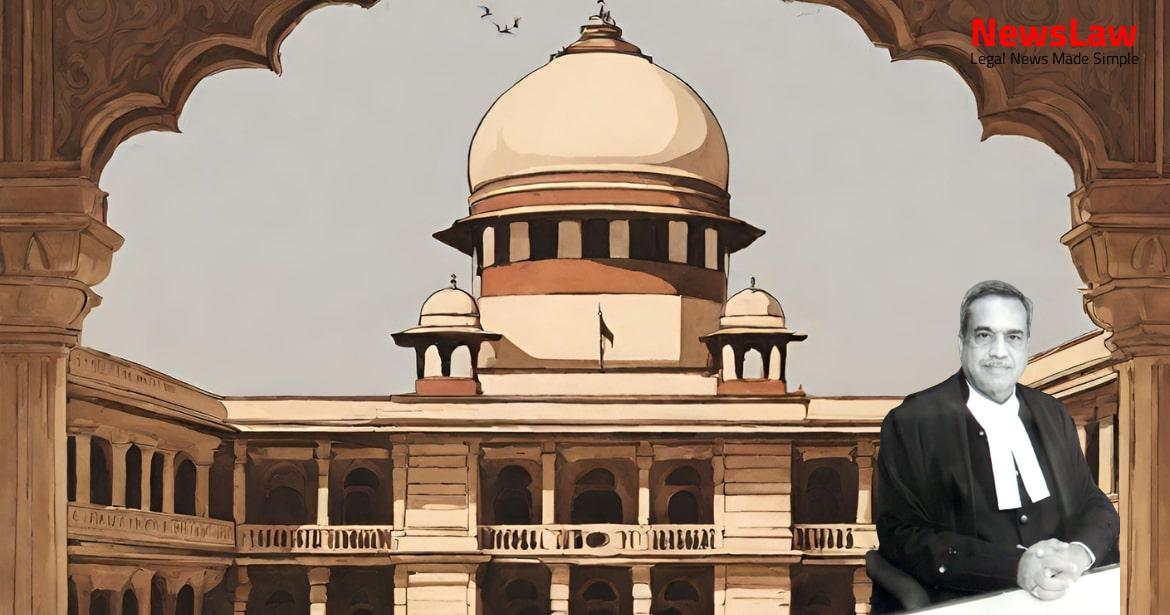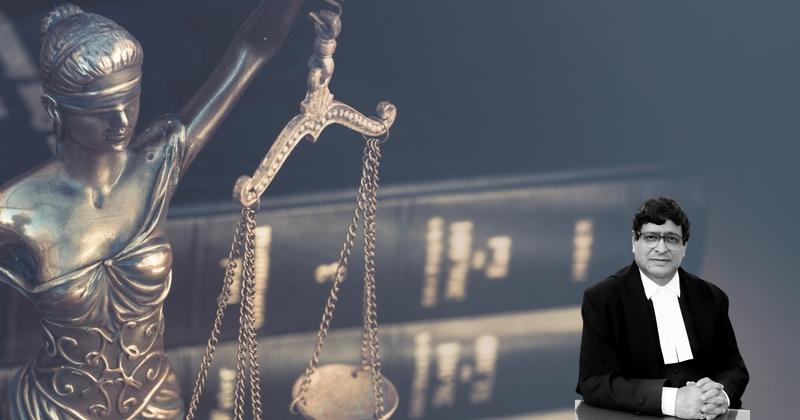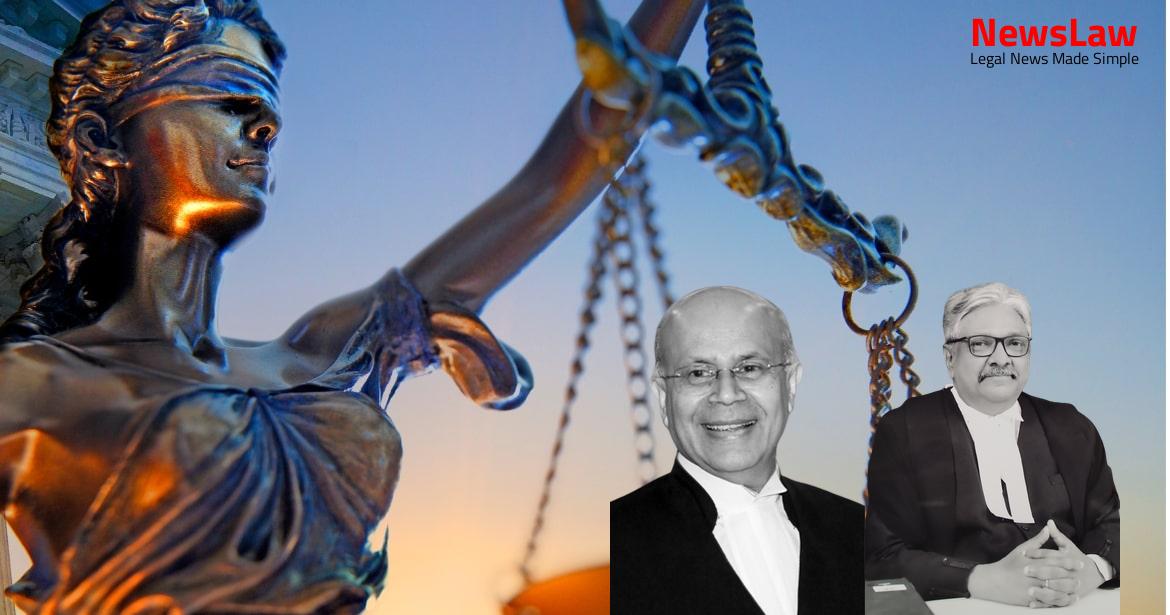A recent legal case involves the revocation of bail granted to an accused due to alleged forgery of court records. The court’s decision highlights the seriousness of manipulating legal documents and the importance of upholding the integrity of judicial records. The accused, facing severe charges, has been ordered to surrender, emphasizing the gravity of the situation. Stay tuned for more updates on this significant legal development.
Facts
- Appellant obtained a certified copy of the decision of the sessions case dated 23.12.2002, which mentioned Respondent No.2 – Mahesh.
- A Special Case No.11/12 Crime No.132/2002 under the Gangsters Act against Mahesh was pending.
- Mahesh was acquitted in the case based on a certified copy of the decision and order dated 23.12.2002.
- Allegations were made against Mahesh for committing offences under Sections 420, 467, 468, 471, 120-B IPC.
- Observations were made regarding fabrication in the court record by the Additional Sessions Judge/Fast Track Court, Unnao.
- The judicial record related to Sessions Trial No.89-A/01, State vs Mahesh, was found to be tampered with.
- The Record keeper lodged an FIR against Mahesh based on the directions of the District and Sessions Judge, Unnao.
- Certain orders were passed on 23.12.2002 in various cases, and a certified copy obtained in 2012 did not list any accused names.
- The court record was tampered with, changing ‘Mahesh’ to ‘Ramesh’.
- The Sessions Judge directed further steps to be taken after discovering the tampering.
- The FIR was lodged based on the order of the District and Sessions Judge.
- The High Court released Respondent No.2 on bail without commenting on the merits of the case, citing the need for evidence to determine innocence or complicity.
- The original informant filed an appeal against the High Court’s decision to grant bail to Respondent No.2.
- Mahesh Singh was acquitted in all cases under the Gangsters Act, including Special Case No. 583/2000.
- The Learned Additional Sessions Judge dismissed the bail application of the accused, considering the seriousness of forging court records.
- The accused then approached the High Court for bail in Case Crime No. 433 of 2019.
- The Record Keeper of the Civil Court lodged an FIR against the accused on the order of the District Judge.
- A writ petition was filed by the appellant before the High Court for action against the accused for committing forgery in court records.
Also Read: Electoral Malpractices in Mayor Election
Arguments
- The appellant argues that the accused benefited from a forged and manipulated court order in a case under the Gangsters Act.
- Several cases have granted bail to accused under Sections 468, 471 IPC while considering the period of incarceration.
- The accused is a history-sheeter with pending cases of murder, attempt to murder, Gangsters Act, etc.
- The accused got acquitted based on the forged order submitted to the Special Court, Gangsters Act.
- The accused has not absconded for 18 years as alleged.
- The accused is accused of manipulation and forgery of the court record, a serious offense.
- The High Court failed to consider the seriousness of the charges and the gravity of the matter while releasing the accused on bail.
- The appellant argues that the accused is benefiting from the forgery and manipulation of court records.
- The High Court should not have released the accused on bail given the seriousness of the offense.
- The State supports the appeal, claiming the accused has been falsely implicated and there are no chances of evading trial or influencing witnesses.
- The documentary evidence in the case is in the custody of the Court, reducing the chances of tampering by the accused.
- The respondent believes that the appellant has personal motives in keeping the accused behind bars.
- The appellant and his father are accused in FIR No.305 of 2019 for killing the appellant’s wife.
- The respondent suggests that the present petition is politically motivated and should not be entertained.
- The respondent is neither the complainant nor the affected person in Case Crime No.433 of 2019.
- Referring to the case of Amanullah vs State of Bihar (2016) 6 SCC 699, the respondent argues that the appeal from a third party with personal grievances against the accused should not be entertained.
Also Read: Balancing Power and Transparency: Electoral Bonds Struck Down, Disclosure Mandated
Analysis
- The High Court granted bail to the accused without adequately considering the seriousness of the allegations against him, which included forging and manipulating court records.
- The accused is facing charges under Sections 420, 467, 468, 471, 120-B IPC which carry significant punishments, including imprisonment of up to 10 years and fines.
- Forging/manipulating court records and benefitting from them is a serious offense that hampers the administration of justice.
- The High Court released the accused on bail without delving into the gravity of the offenses and the severity of the matter related to forgery/manipulation of court orders.
- The FIR was lodged by the court record keeper based on a report that the court record had been manipulated and forged, leading to the initiation of legal action against the accused.
- The severity of the offense is a crucial aspect to consider when granting bail, which the High Court failed to do in this case.
- The appellant has the right to file for the cancellation of bail, especially in a case where tampering with court orders is alleged and deemed serious enough to warrant legal action.
- The High Court’s decision to release Respondent No.2 – accused on bail is unsustainable and is quashed and set aside.
- Respondent No.2 – accused is required to surrender immediately due to the cancellation of the bail.
- Any observations made in this order are limited to the bail grant and trial should proceed according to the law and its merits.
- The appeal is allowed.
Also Read: Recall of Resolution Plan Approval: Legal Analysis
Case Title: NAVEEN SINGH Vs. THE STATE OF UTTAR PRADESH (2021 INSC 182)
Case Number: Crl.A. No.-000320-000320 / 2021



